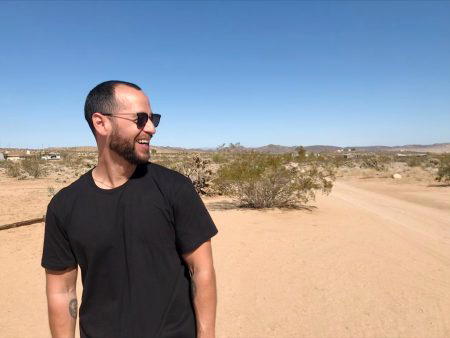Mama don’t remember Tío Kiko taught me tattoos—no one does but me. We sat in the backyard behind the long flat house we got in California, leaned against his Bronco shaded by the avocado tree we got in California too. He said, mustache flared, “All you need’s a bic, a lighter, and shoe polish, Lil D. Go on a mission.”
He’d been in the army. Mostly, in the pen—still, he liked sending me on missions. Sometimes missions for him, to the fridge for cold beers, sometimes missions meant for no one but me.
#
He stripped the pen like a rifle. Tugged the ink and roller out with his teeth and spat the piece at me. I understood I should hold it. He could make you understand things with those dark eyes, those thick eyebrows that when they moved up or down seemed to weigh your worth. Then he put the needle in place at the tip of the pen and melted the plastic until the pen gripped the needle in black folds.
We practiced carving pictures in a Frisbee, him blowing away the tiny worms of plastic coiling from the needle’s tip. The skeletons he drew were happy but nearly invisible. He covered them with shoe polish he thumbed in and I bit my tongue because I’d thought he’d ruined them. But then he spat on the clean thumb and rubbed. The extra shoe polish faded and the black skeletons danced to life. Looked like they would dance forever, too dark to fade.
“Your turn.” He floated the frisbee’s characters across the grass, took a seat on the Bronco’s tailgate. “Where you want it?”
I hadn’t thought ahead. If I answered wrong after he’d shared the ritual wouldn’t it insult him—no, disappoint? His neck-tattoos were girls’ names scrolled and curled. His chest and back tattoos he wouldn’t talk about. One arm held two faces, one smiling, the other crying. I liked that they were clownish and sad, both. Made me wonder what kind of adult I’d become.
I offered my right arm, raising its weight with the other, like you’d lift your hands at communion.
That night, Mama scrubbed it with a rough sponge, while the others slept. From my place sitting on the sink, I could see the beds ransacked of pillows. See huddled shapes on the floor, safer from bullets. The phone had stopped ringing. I liked it quiet.
Mama didn’t. She heard how hard she’d been scrubbing. She went easy.
Tío Kiko wouldn’t stop calling. My sister was out with someone else.
When the new guy had come to get her, I asked, “Who’s the fag in the Honda?”
She had smacked the back of my head, clicked her dark lips. “We ain’t need to hang with no fucking criminals no more.”
From the front window I had watched her drop into the passenger seat, passenger being a joke; by their silhouettes in the windows she was the one giving him the directions.
Now, Tío Kiko’s Bronco rumbled in their place.
He kept calling the house, calling out his window, waving his pistol out the window too. He said he’d shoot everyone and circled the block. He just wanted to know where she was, he kept saying.
He couldn’t just drive away, cause that would mean quitting. But he couldn’t sit out front just waiting on her, neither. Even I knew that.
The phone rang. Mama stopped scrubbing, the flesh of her eyes tired, the eyes themselves frantic. “Why are you crying?”
The only answer I could think of was, “It hurts when you scrub hard.”
Outside, tires screeched. Sirens said somebody had called the police.
“Mijo.” Mama started scrubbing again, softer, barely touching me. She wasn’t in the room, not really. “He won’t hurt us. He’s a crazy. He’s on drugs. The cops’ll get him.” But when she said that it hurt in my ribs and my throat. After a while she left me sitting alone on the sink. I touched the tender skin on my arm. I traced the tattoo’s shape he’d drawn there. There were no faces. Not sad or happy. All along, a couple of ghosts.


